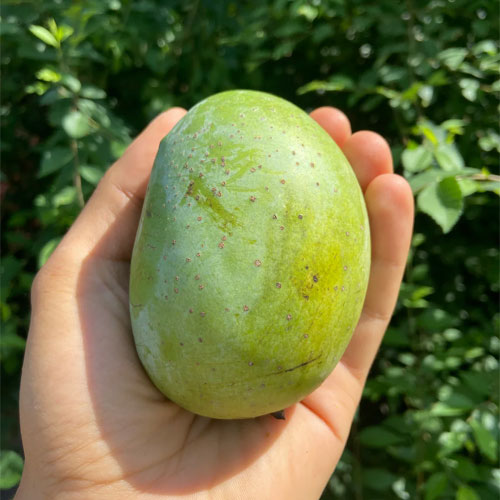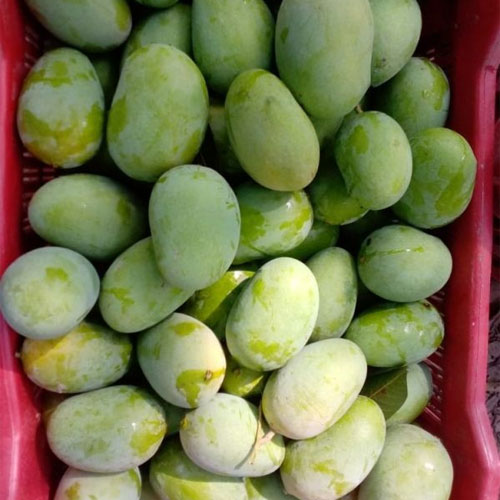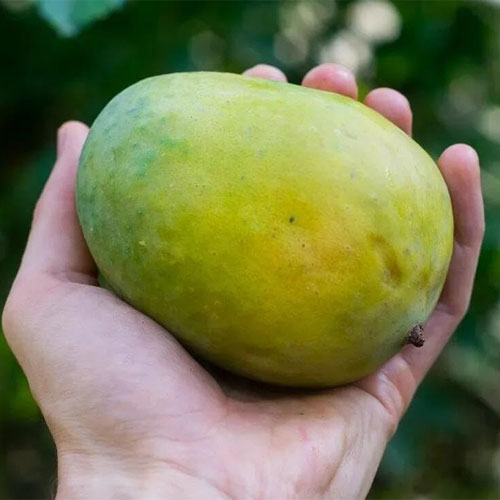Experience the legendary sweetness and aroma of North India with the Langra Mango Grafted Live Plant, also known as Benarasi Langra. Famous for its rich fragrance, fiberless texture, and unique greenish hue even when ripe, this heirloom variety has been cherished for over 300 years. Perfect for both home gardens and orchards, this grafted plant delivers early fruiting, high yield, and the original taste of Banaras. Thrives in Indian climates and performs well in containers or open fields, making it a must-have for mango lovers.
Whether you're a mango connoisseur or a passionate gardener, the Langra mango promises a delightful harvest with minimal maintenance. Add this historic gem to your collection and enjoy sweet, juicy fruits with heritage flavor every summer.
Variety Name: Langra Mango (Benarasi Langra)
Type of Plant: Grafted Fruit Live Plant
Germination Time: 10–15 days (for new shoots from graft)
Sunlight Requirements: Full Sun (6–8 hours daily)
Growing Locations: Outdoor garden, terrace, farmland
Growing Season: All Year (except peak monsoon for planting)
Planting Depth: Root ball at surface, do not bury graft joint
Ideal Climate: Tropical to Subtropical
Plant Height on Delivery: 1.5 to 2 Feet
Fertilizer Requirement: Organic compost, vermicompost, NPK 6-6-6
Life Span: Over 50 years with proper care
Ideal Growing Temperature: 25°C to 38°C
Harvest Time: May to July (2–3 years after planting)
Maintenance Required: Low to Medium
Watering Frequency: Twice a week or as needed
Ideal Grow Bag Size: 24x24 inch or plant in ground



The Langra mango tree can be planted almost year-round in India, with ideal periods being February to April and August to October. The fruits ripen during the early summer months, making it one of the first varieties to harvest. North Indian regions like Uttar Pradesh and Bihar are the traditional growing belts, but it adapts well across India.
Use a 24×24 inch HDPE grow bag or clay pot with good drainage. Fill it with fertile loamy soil mixed with compost. Place the grafted plant ensuring the graft union stays above soil level. Water regularly and ensure it receives full sun. Re-pot every 2 years for best growth.
Preparation: Choose a sunny location with well-drained soil.
Planting: Dig a hole twice the size of the root ball. Place the grafted plant with graft above the soil.
Watering: Water thoroughly after planting. Maintain moist (not soggy) soil.
Germination & Growth: New growth may start in 2–3 weeks.
Transplanting: Not required if planted in ground. If in pot, re-pot every 2 years.
Sunlight: 6–8 hours direct sun daily
Soil: Well-drained loamy or sandy soil
Fertilization: Use cow dung, compost, or fruit tree fertilizer thrice yearly
Pruning: Trim weak or crowded branches annually
Support & Spacing: 15 feet spacing in ground
Pest Control: Use neem oil spray for mealy bugs or leaf miners
Disease Prevention: Ensure airflow and avoid water stagnation
Mulching: Mulch with dry leaves or straw to retain soil moisture
Harvesting: Pick fruits when slightly soft and greenish-yellow
1. Apply Nutrient-Rich Fertilizers
When your plants begin flowering, use nutrient-rich fertilizers like Organic Bone Meal Powder or Vermicompost. This helps in boosting the bloom and enhances overall yield.
2. Use Organic Fertilizers
Feed your plants with organic fertilizers such as Cow Dung Manure or Neem Cake. Organic options promote healthy soil life.
3. Regular Feeding
Apply fertilizers every 20-25 days to ensure plants receive a steady supply of nutrients. Choose from various options like Cocopeat Compost for moisture retention.
Langra mango trees are early-fruiting, high-yielding, and grow well in both tropical and subtropical climates. The fruit maintains a greenish outer color even when ripe, with a sweet and smooth pulp inside. It is fiberless, making it perfect for juicing, slicing, or eating raw. The aroma is so unique that many recognize Langra mangoes just by the smell. Great for gardens and terrace plantations.
Consumed fresh as a juicy summer delight
Used in desserts, juices, aamras, chutneys, and jams
Rich in Vitamin C, A, and antioxidants
Easy to grow for home use
Highly demanded mango variety in Indian households
Protect young plants from heavy rains and wind
Do not overwater, especially in winter
Avoid planting in poor drainage areas
Fertilize as per seasonal schedule to boost fruiting
Prevent fungal attack with natural anti-fungals like neem oil
Black spots on leaves: Caused by fungal infection. Use copper fungicide.
Leaf curling: Due to aphid attack. Use neem oil spray.
No flowering: May need more sunlight or phosphorus-rich fertilizer.
Poor fruit size: Thin out excess fruit to boost quality.
Langra Aam, Benarasi Langda, Langda Mango, Langda Amba, Langda Maambazham, Langra Mamidi, Langda Maanga, Langra King Mango
Q1: Is this a grafted Langra mango?
Yes, it is a professionally grafted Langra mango plant ensuring early fruiting.
Q2: When will it start fruiting?
Usually within 2 to 3 years if properly cared for.
Q3: Can I grow it in a pot?
Yes, use a 24x24 inch grow bag or large cement pot.
Q4: Does it require special fertilizer?
Use organic compost, vermicompost, or fruit tree fertilizers 3–4 times a year.
Sign in now to receive a 5% instant discount on your first order when using code WELCOME. Begin your organic journey today!
By logging in, you're agreeing to our Terms of Service and Privacy Policy.
Iqra
Golden Hills Farm ke plants sabse reliable hain.
Sneha
Langra Mango Grafted Live Plant healthy aur green condition me deliver hua.
Komal
Healthy aur strong grafted plant, koi pest issue nahi tha.
Renu
Golden Hills Farm ke grafted plants sabse acchi quality ke hote hain.
Tanvi
Bahut sundar aur traditional Langra variety hai, taste amazing hai.
Oviya
Healthy aur pest-free plant deliver hua, roots strong the.
Chirag
Bahut accha result mila, leaves lush green aur healthy hain.
Aarav
Bahut accha packaging tha aur koi damage nahi hua delivery ke time.
Eshan
Bahut premium quality ka Langra mango plant mila.
Fatima
Golden Hills Farm se hamesha premium quality plants milte hain.